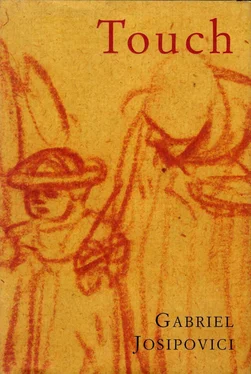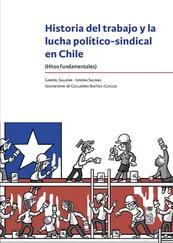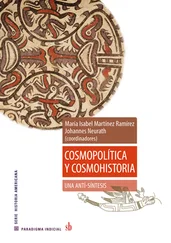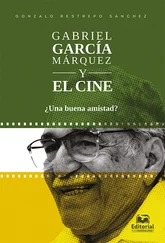Gabriel Josipovici - Touch
Здесь есть возможность читать онлайн «Gabriel Josipovici - Touch» весь текст электронной книги совершенно бесплатно (целиком полную версию без сокращений). В некоторых случаях можно слушать аудио, скачать через торрент в формате fb2 и присутствует краткое содержание. Год выпуска: 1996, ISBN: 1996, Издательство: Yale University Press, Жанр: Современная проза, на английском языке. Описание произведения, (предисловие) а так же отзывы посетителей доступны на портале библиотеки ЛибКат.
- Название:Touch
- Автор:
- Издательство:Yale University Press
- Жанр:
- Год:1996
- ISBN:0300066902
- Рейтинг книги:5 / 5. Голосов: 1
-
Избранное:Добавить в избранное
- Отзывы:
-
Ваша оценка:
- 100
- 1
- 2
- 3
- 4
- 5
Touch: краткое содержание, описание и аннотация
Предлагаем к чтению аннотацию, описание, краткое содержание или предисловие (зависит от того, что написал сам автор книги «Touch»). Если вы не нашли необходимую информацию о книге — напишите в комментариях, мы постараемся отыскать её.
Touch — читать онлайн бесплатно полную книгу (весь текст) целиком
Ниже представлен текст книги, разбитый по страницам. Система сохранения места последней прочитанной страницы, позволяет с удобством читать онлайн бесплатно книгу «Touch», без необходимости каждый раз заново искать на чём Вы остановились. Поставьте закладку, и сможете в любой момент перейти на страницу, на которой закончили чтение.
Интервал:
Закладка:
Yet, despite this duplicity or sentimentality (the two go together, since it is the belief that life has been hard on us that leads to self-pity), her description of the course her life has taken is profoundly moving, not least because of the conflict it makes manifest, and which she herself does not seem to be aware of, or cannot admit to herself, between the longing for the peace known by the river and the need to be with her lover and to keep affirming their innocence. Yet this conflict does come into the open when, pressed by Dante to say more, she admits (echoing Virgil and Boethius): ‘Nessun maggior dolore/ che ricordarsi del tempo felice/ ne la miseria’ [There is no greater sorrow than to recall, in wretchedness, the happy time]. Locked in the prison of her desires, she can only move helplessly between a wretched present and a past which grows more idyllic each time she recalls and retells it, but whose relation to the present she persistently refuses to acknowledge:
Ma s'a conoscer la prima radice
del nostro amor tu hai cotanto affetto,
dirò come colui che piange e dice.
Noi leggiavamo un giorno per diletto
di Lancialotto come amor lo strinse;
soli eravamo e sanza alcun sospetto.
Per più fiate li occhi ci sospinse
quella lettura, e scolorocci il viso;
ma solo un punto fu quel che ci vinse.
Quando leggemmo il disïato riso
esser basciato da cotanto amante,
questi, che mai da me non fia diviso,
La bocca mi basciò tutto tremante.
Galeotto fu'l libro e chi lo scrisse:
quel giorno più non vi leggemmo avante.
(124–38)
Paolo does not kiss her, he kisses her mouth, just as in the story of Lancelot and Guinevere which they are reading it is not the queen who is kissed but the ‘desired smile’. In addiction, as in the mirror, the self is fragmented and bits of the body float free of any unifying responsible self. That is why fetishism and addiction go together. And even here it is the book and its author who are blamed, while Paolo and Francesca remain the helpless victims of circumstances and their passion.
Yet it would be wrong to think we could stand back from Francesca and simply ‘place’ her in some objective scheme of things, for Dante is no more dismissive of her than the narrator in Proust's novel is of his young self. The pity Dante feels for her, culminating in his swooning as she finishes telling her story, may in part be seen as a weakness and worthy of the reprimand Virgil delivers, an importing of purely human values into the immutable world of the afterlife, but Dante's poem does not work by denying human feelings but rather by incorporating them into some larger design. Belaqua Shua, in Beckett's early story ‘Dante and the Lobster’ is quite right to question Virgil's chilling phrase, ‘Qui vive la pietà quand'è ben morta’, which might be translated as ‘Here piety lives when pity is quite dead’ (xx.28), but at the cost of separating out too neatly the two senses of pietà in Dante's Italian. After all, in the Convivio Dante had described pietà as the greatest of the virtues and not simply an unthinking emotional response: ‘Pity, however,’ he says, ‘is not an emotion, but a noble disposition of spirit, ready to receive love, misericord, and other beneficent feelings’ (II.x.). For the truth of the matter is that Francesca is a mirror in which Dante can recognise much of what he most values in himself.
After all, Francesca, as critics have pointed out, speaks the language of the dolce stil nuovo , the language which Dante learned from his older contemporaries, Guido Guinizelli and Guido Cavalcanti and which, in his first great work, the Vita nuova , he made his own. And the important thing to note is that, in writing his mature masterpiece, the Commedia , he does not leave such language behind. After all, as he says to Bonagiunta in Purgatory: ‘I'mi son un che, quando Amor mi spira, noto, e a quel modo/ ch'e ditta dentro vo significando’ [I am one who when love breathes in me, takes note, and, in that manner in which he dictates within, go on to set it forth] (xxiv.52–4). This is the language in which he discovered himself as a poet and it is still the language in which, as Jill Mann has acutely noted, ‘Dante realises his relationship with Beatrice in Purgatorio and Paradiso .’ ‘It is of course true’, she goes on, ‘that he fills this language with a wealth of spiritual meanings. … But …, whatever the deepening of meaning, a continuity between earthly and divine love is maintained at the level of language; it is the language of the love-lyric that becomes the mould into which the spiritual experience is shaped.’
As with Proust in the little room smelling of orris-root, so here, what is presented to us is far too important, far too central to the narrator's own growth as man and artist, to be simply put to one side. The power of the work of both Proust and Dante stems from the fact that both recognise the immense significance of such experiences, incorporate them into their final works, yet manage, through and in their writing, to escape from their addictive hold back into the world of human choice and responsibility.
To say that addiction is a way of relieving loneliness is to give the wrong impression. What it relieves is the sensory deprivation attendant on solitary confinement. And solitary confinement, as I have been suggesting, does not require four walls, a locked door and a jailor; it merely requires that we lose our sense of natural reciprocity with the world and are so painfully aware of that loss that we try to make it good in any way we can. When William Burroughs questions himself as to why he ever became a heroin addict he has to admit that boredom had a lot to do with it. None of the options of bourgeois life open to him held out any interest for him and what he saw of those who ‘got on’, who made what the world considered a success of their lives, positively nauseated him. Becoming a junkie was a way of escaping from this, and he brings out powerfully how much of an effort of will is actually involved in that, how long it takes to get really and truly hooked.
Unfortunately addiction cannot fully satisfy our desires either and thus leaves us in the state which all those in Dante's Hell experience: the state of being in perpetual hopeless longing — ‘sanza speme vivemo in disio’.
Stanley Cavell, in his thoughtful book on film to which I have already referred, comes close to making the same point about film but shies away from the identification of film and addiction. But his perceptive remarks cut across the banalities of most film theory and help us to understand what is at issue. ‘To say that we wish to view the world itself’, he argues,
is to say that we are wishing for the condition of viewing as such. That is our way of establishing our connection with the world: through viewing, or having views of it. Our condition has become one in which our natural mode of perception is to view, feeling unseen. We do not so much look at the world as look out at it, from behind the self. It is our fantasies, now all but completely thwarted and out of hand, which are unseen and must be kept unseen. As if we could no longer hope that anyone might share them — at just the moment that they are pouring into the streets, less private than ever. So we are less than ever in a position to marry them to the world. Viewing a movie makes this condition automatic, takes the responsibility for it out of our hands. Hence movies seem more natural than reality. Not because they are escapes into fantasy, but because they are reliefs from private fantasy and its responsibilities; from the fact that the world is already drawn by fantasy. And not because they are dreams, but because they permit the self to be wakened, so that we may stop withdrawing our longings further into ourselves.
Читать дальшеИнтервал:
Закладка:
Похожие книги на «Touch»
Представляем Вашему вниманию похожие книги на «Touch» списком для выбора. Мы отобрали схожую по названию и смыслу литературу в надежде предоставить читателям больше вариантов отыскать новые, интересные, ещё непрочитанные произведения.
Обсуждение, отзывы о книге «Touch» и просто собственные мнения читателей. Оставьте ваши комментарии, напишите, что Вы думаете о произведении, его смысле или главных героях. Укажите что конкретно понравилось, а что нет, и почему Вы так считаете.












